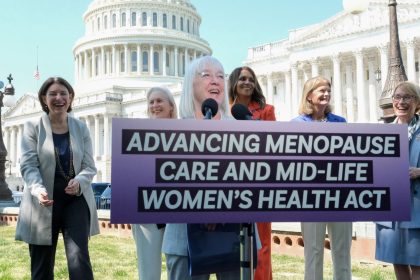Analysis: A Big Issue Voters Might Be Missing

WASHINGTON — Democrats who say they are determined to keep voters focused on health care this year were hoping that the Supreme Court would hand them a ready-made campaign ad and a potential courtroom win.
Instead, the court recently punted on a major decision over whether to kill the 2010 health care law that expanded coverage to more than 20 million Americans. Now, Democrats hope that by shifting their attention to high prescription drug prices they might still mobilize voters and help the party maintain its edge on health care, the public’s top domestic concern, although Republicans also are focused on drug prices.
But without a high-profile appeals hearing at the Supreme Court about the fate of the 2010 law, it could be harder for Democrats to drive interest in the lawsuit, Texas v. Azar, ahead of Election Day.
“There’s a lot of concern and apprehension in what (overturning the law) would mean, and yet it’s been playing out for so long, it hardly feels like a new story and it’s hard to maintain the same level of urgency,” says Melinda Buntin, chair of the health policy department at Vanderbilt University. “Yet the extreme disruption that would be caused by the repeal of the (health care law) is just as real as it’s always been.”
The lawsuit brought by Texas and other conservative state attorneys general to overturn the law came after Congress ended its penalty for those without insurance. The Trump administration backed the suit, calling for the entire law to fall. But several blue-state officials and the House defended it and requested a quick resolution. If the high court had expedited the case, Democrats could have pointed to it as an imminent threat.
So far, the lawsuit hasn’t appeared to register with voters in the same way congressional GOP efforts to roll back the law did in 2017, when the Obamacare repeal proposals dominated town hall meetings and led to protests on Capitol Hill. Democrats leveraged voters’ fears that they would lose coverage, which helped flip the House to Democratic control in 2018.
“People thought, women voters in particular thought, we’ve sent a clear message” on health care, says Democratic pollster Celinda Lake. “Then (President Donald) Trump went at it right away, again. That really energized voters because they thought, ‘Wow, he really didn’t hear us.’”
Legal experts on both sides of the aisle are skeptical of the case’s legal arguments, but the risk to the law remains. Whether voters are aware of that is an open question.
But broad concerns over health care do remain top of mind for voters, polls show.
Republicans hope to counter their rivals’ message by taking advantage of divisions among Democrats over whether to undertake another ambitious overhaul of the health care system. Liberal presidential candidates, including independent Sen. Bernie Sanders of Vermont and Massachusetts Democratic Sen. Elizabeth Warren, would move the nation toward a government-run system, while moderates including former Vice President Joe Biden say that idea is too costly.
Douglas Holtz-Eakin, president of the right-leaning American Action Network, said Republicans will have an easier time focusing on those proposals without a more immediate threat to the 2010 law.
“It takes off the table having to talk about comprehensive reforms that would be in lieu of the ACA, and that I think is probably to their benefit,” Holtz-Eakin says, using the law’s acronym. “They can instead focus on some issues where they feel they will have some things to say.”
GOP candidates also note that Trump created a comprehensive plan designed to cut drug prices. While voters overwhelmingly agree that no one in Washington has done enough to lower drug costs, a November Kaiser Family Foundation poll found that 22% of voters said Trump is “doing enough,” while only 17% said congressional Democrats are.
Still, Democratic strategists and pollsters say they are confident the party will keep its advantage on health care.
Polls show that even as Democrats debate the future of health care within their party, voters are more likely to distrust Republicans on the issue. A January CNN poll found that 53% of voters disapprove of Trump’s health care agenda, while 38% approve.
Voters tell pollsters that lowering drug prices is also a top concern.
The Democratic Congressional Campaign Committee recently launched a seven-figure ad campaign criticizing Republicans for not supporting the House’s sweeping bill (HR 3) to lower drug prices.
Brad Woodhouse, executive director of Protect Our Care, which defends the health care law, says Democrats may need to work overtime to make voters aware of the lawsuit.
Woodhouse says Democrats will keep the issue alive, highlighting it if Trump brings up health care in his Feb. 4 State of the Union address and on the 10-year anniversary of the signing of the health law in March.
“Without a fight over repeal, it’s going to require groups like us doing everything we can to break through every day,” Woodhouse said.
———
©2020 CQ-Roll Call, Inc., All Rights Reserved
Visit CQ Roll Call at www.rollcall.com
Distributed by Tribune Content Agency, LLC.
























